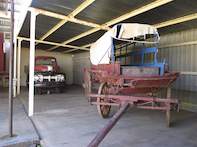No Need for Roads Pre Europeans
The first roads in South Africa came with the Europeans. Before the Dutch East India Company landed on our shores, footpaths, cattle tracks and bare feet got you just about anywhere you wanted to go.

Wheeled transport was unknown, and there was simply no need for roads.
In retrospect, it is strange that Africa never really got hold of the wheel as a useful concept. I suppose it’s just a matter of necessity being the mother of invention, and subsistence farming doesn’t really require a wagon to take goods to market.
In any event, the various mountain ranges that cut the country into slices were not easily crossed by wagon wheels - a geographical reality was to be well appreciated by road builders in the years to come.
Wagons Roll
So, it was only when Jan van Riebeeck and crew disembarked with notions of corporate enterprise that the business of road building slowly began in South Africa.
But making roads was not an initial priority for the new commander. As has already been discussed, the early years of the Dutch East India Company settlement at the Cape were tough.
There was little food, no support and no infrastructure. The only commodity not in short supply was wood.
Tall stands of trees covered the slopes of Table Mountain, and getting timber for building or heating was simply a matter of chopping down a likely looking specimen and dragging it down to the fort.
However, trees cannot be carried by man alone, and timber must be transported on a wagon to achieve any kind of economy of scale. Wagons, in turn, need roads, and so began the history of roads in South Africa.
 After the Portuguese came to the Cape, the ships of many nations plied the rich but hazardous trade route to the East. To head the task forc...
After the Portuguese came to the Cape, the ships of many nations plied the rich but hazardous trade route to the East. To head the task forc... At first, the Dutch East India Company were utterly disinterested in the land beyond the Cape of Good Hope. Their only concern was to turn a...
At first, the Dutch East India Company were utterly disinterested in the land beyond the Cape of Good Hope. Their only concern was to turn a...